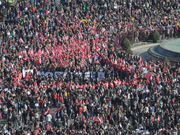News
Spanish protests against austerity plans

As Spanish bank bailouts and EU austerity plans threaten more and more employment and social peace in the country, UNI and its affiliates call for an urgent solidarity plan between Spain and the other EU countries to prevent the potentially highly destructive consequences of the Spanish crisis. As Prime Minister Mariano Rajoy announced an increase in value added tax from 18 to 21% and the reduction of unemployment benefit packages, thousands of miners marched on the streets of Madrid, followed by anti-austerity protesters. After some violent clashes between protesters and police officers, five people were arrested and three people suffered minor injuries.
Philip Jennings, Secretary General of UNI Global Union, said, "The announcement by Prime Minister Rajoy to cut subsidies by 20% in 2013 for political parties and unions is a real threat to democracy in Spain These are the type of slash and burn austerity
measures which have deepened the crisis rather than the kind of growth strategy we need to get out of it. The dignity of the Spanish miners standing up for their rights amongst bullets and batons will leave an indelible impression and will remind many of Thatcher's tactics against UK miners in the 80s. This is not the way forward. Spain and the rest of Europe must change course."
Mr. Rajoy's announcement followed European officials' agreement to allow Spain an extra year to meet its public deficit reduction targets and to finalize the €100 billion European rescue plan to the country's banking sector.
European authorities are also pressing Spain to inflict billions of euros of losses on small savers by wiping some certain types of bank debt before recapitalising its financial institutions with eurozone rescue funds. Spain faces a particularly difficult situation because of the size of its banking sector relative to the economy and the depth of the banking losses.
The EU had promised Spain to help the country re-finance its banks directly through the Financial Security without increasing the public debt, but this plan has not yet been implemented as the countries of Eurozone group are still in the process of setting up a new rescue mechanism which should be officially adopted on July 20th.
Oliver Roethig, Head of UNI Europa said, "The civil unrest which started in Greece and Spain could easily spread to the rest of Europe if European leaders fail to recognize that fiscal austerity is damaging the patient's health rather than leading to recovery".

